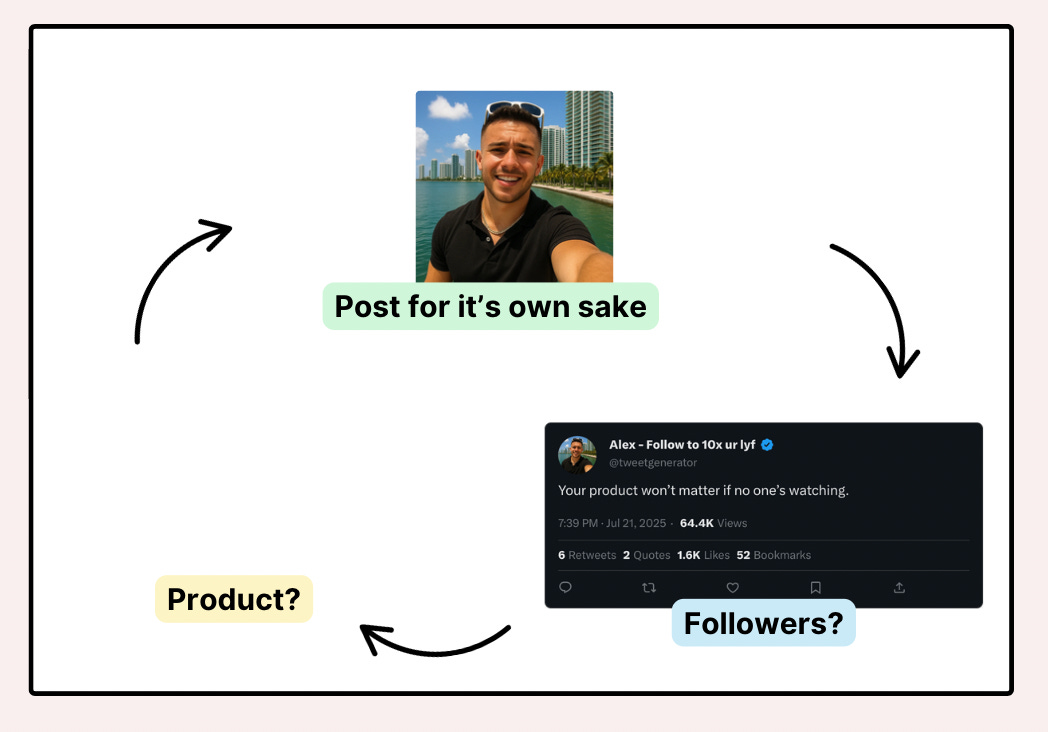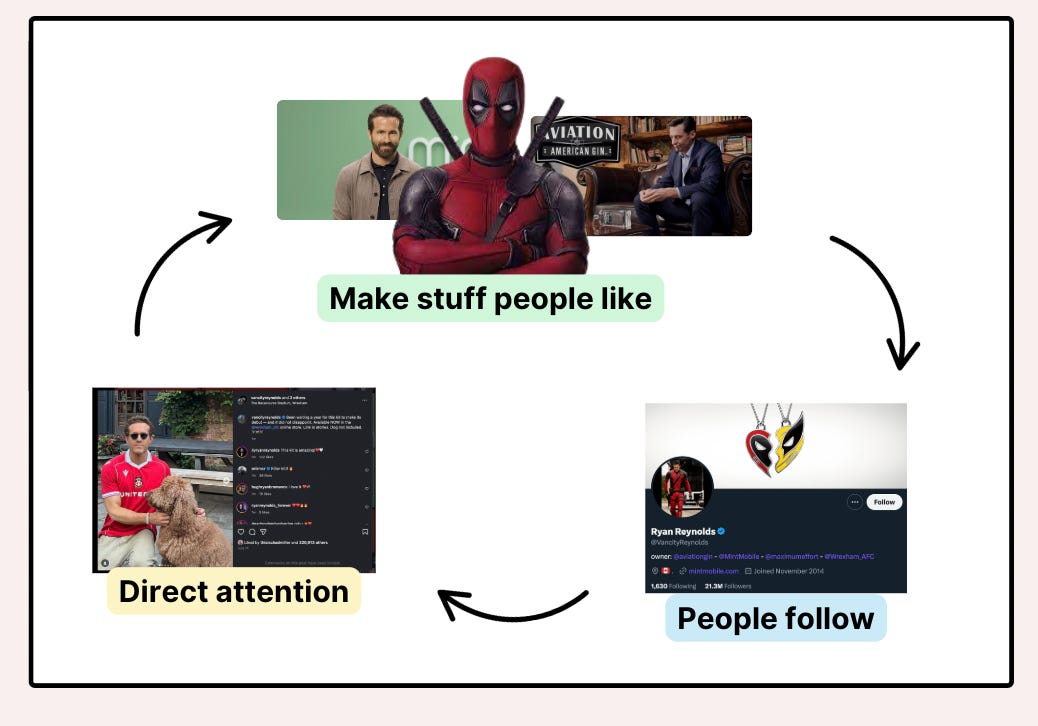🍯 Ryan Reynolds as a Maker Creator
How Ryan Reynolds strategically applies his personal brand across multiple products and interests.
Hey folks, I’m trying something different for my newsletter this week. Rather than a roundup of links, I thought I’d coalesce a few things I’ve been reading and thinking about into a (hopefully) short essay around a specific idea. I’m keen to hear what you think.
/ Ben
A lot of people are jumping on the personal brand bandwagon (including me). But something that always felt a bit hollow to me was its most common approach:
Building an audience first, before having a product.
It sometimes leads folks to vapid social media. Performative posting, annoying platitudes, follow for follow, and other distasteful behaviour on social media.
I’m not the only one who thinks this, as Jakob Greenfield suggests it can contribute to the Bullshit Creative Industrial Complex (🤣), where people try to build credibility through curated insight (like this newsletter?) rather than value production. People should Build a business, not an audience.
The other problem is that this sometimes makes it harder to start. What do you post about if you’re not working on something? People have often asked me, a non-expert btw, things like:
How do I pick my niche?
What do I post about?
etc
By chance, I came across an essay written by Darin Persinger on A Peek Inside Ryan Reynolds’s Business Model, on how Ryan used his comedic media skills to co-found a marketing agency that he then uses on his own projects.
Looking at this, I think his story offers some cool ideas on HOW the maker-creator model can be done tastefully, as an opposite to the audience-first approach.
✋ Side note: What’s a maker creator? When I say maker here, I mean makers in the broad sense of the word. People who create things that produce value for others, books, apps, websites, physical products, businesses, etc. And a creator as somebody who creates content, often involving themselves, to promote things.
Lessons for Maker Creators
None of these are rocket science, but a nice encapsulation of the ideas in practice:
Avoid personal content brands to improve severability. It’s a silly example, but had Ryan made Reynolds Telecom or Reynolds Gin, I’d argue it’d be much harder for him to have sold out of his stakes along the way. Instead, each project simply featured him in the content, boosting the project’s visibility and naturally building his following that he could direct towards other projects later, too. This is great news for people who have multiple interests, and aligns with the perspective shared by Stevie Dillon in her article don’t build businesses, build projects.
Focus on interesting projects to attract natural followers. People follow Ryan not because they love his lifestyle content or memes on his Instagram (Dagobert’s experience), but because the like his work and then become interested in him. It’s clear from his timeline is that each project grew his popularity. And I’m not suggesting it’s always a business, but I think making it a project of some kind fits this idea. The focus is on making things people love.
Use yourself in your project and it’s content. I doubt much of this would have worked had he never appeared in any movies or adverts etc. He’s clearly IN his work, which allows people to discover and want to follow him. An interesting example of this is John Rush who puts his name directly on his work as a SaaS founder. (See example).
Use your profile for commentary & direct attention. He seems to leverage his social media profiles to talk about his work across different interests, rather than becoming the main and only outlet for content about those things. Like building in public. This is also different to creator brands who lead with their name, only to get locked into a niche later. This came up twice in Nathan Barry’s article, The Billion Dollar Creator, where one creator even added an edit to suggest he wouldn’t build a brand around his personal name anymore.
Examples
Rand Fishkin. Known for Whiteboard Friday SEO content made at Moz.
Gary Vaynerchuk. Known for Wine Library TV. Now has Empathy Wines.
Peter Askew. Known for building Onions.com, became popular after the viral article I Sell Onions on the Internet.
TLDR: Ryan focused on making things that people liked, rather than building an audience. That grew his following, skills and assets. He then used those to build more things that people liked. He rich now.
Focus on the work and become known for something, not about something.
At the risk of adding waaay too many links, here are a few other bits I’d like to share this week:
1️⃣ How to run smarter LinkedIn ads for SaaS and services
I met Mony Chhim , a sharp LinkedIn advertiser doing work for B2B clients - and had to fire up my podcast again to record a conversation. We got into targeting strategy, what works in LinkedIn Ads, and how to make LinkedIn actually generate pipeline without melting a credit card.
🎙️ LinkedIn Ad Strategy for SaaS & Services, with Mony Chhim (40 minutes)
—
2️⃣ A better way for video creators to showcase their work
My friend Kenny - Your Freelance Friend just launched ProudWork which gives videographers and editors a bloat-free video player that streams directly from your cloud - no uploads, no distractions.
🛠️ ProudWork.io
—
3️⃣ How I dropped Facebook lead costs from £8 to £2
I made a video breaking down a local lead gen account I turned around - cutting CPL from £8 to £2 and keeping it there. This isn’t a fluke week, either, thankfully. Might help if you're working on Facebook Ads for local or service-based offers.
📺 How I Dropped Facebook Lead Costs by 75% (10 minutes)
P.S. Want to build something together?
Here are a few ways we could collaborate:
Validate your product idea: Use HypeDeck.io to get early feedback before building anything. Great if you're still testing the waters.
Work with me on Facebook Ads: If you want help running ads or want to bounce around strategy ideas, reach out here.
DIY your own ads: I made this for my friends who asked for a speedrun on DIY lead ads. It’s how I do what I do, condensed into a digital playbook. You can get it too on Gumroad.




I keep thinking one day I will use ads but I'd have to sit still long enough to finish something... 😂
I'm coming to look you up when Postcard Fest is ready.
How much in advance of an event date should I start ads?
nice post Ben, you always have links to valuable posts i'd never find and give me a look into the indie digital marking world that isn't in my regular feed